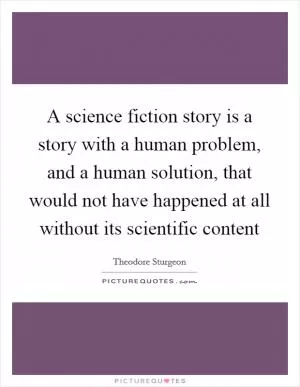Basically, fiction is people. You can't write fiction about ideas

Basically, fiction is people. You can't write fiction about ideas
Theodore Sturgeon, a renowned science fiction writer, once famously said, "Basically, fiction is people. You can't write fiction about ideas." This statement encapsulates Sturgeon's belief that at the heart of any compelling story lies the human experience. Sturgeon's own works are a testament to this philosophy, as he often delved deep into the complexities of human emotions, relationships, and struggles in his writing.Sturgeon's most famous works, such as "More Than Human" and "The Dreaming Jewels," are characterized by their richly developed characters and intricate interpersonal dynamics. In these stories, Sturgeon explores themes of identity, alienation, and the search for connection in a world that often feels cold and indifferent. By focusing on the inner lives of his characters, Sturgeon was able to create narratives that resonated with readers on a deeply emotional level.
One of the reasons why Sturgeon believed that fiction is fundamentally about people is because he understood that it is through the experiences of characters that readers are able to connect with and make sense of the world around them. By immersing readers in the lives of his characters, Sturgeon was able to explore complex ideas and philosophical concepts in a way that felt personal and relatable. For Sturgeon, the human experience was the lens through which all other themes and ideas could be explored and understood.
Sturgeon's insistence on the importance of people in fiction also speaks to his belief in the power of storytelling as a means of empathy and understanding. By placing characters at the center of his narratives, Sturgeon was able to create a space for readers to step into the shoes of others, to see the world through different eyes, and to ultimately develop a deeper sense of compassion and empathy for their fellow human beings.












 Friendship Quotes
Friendship Quotes Love Quotes
Love Quotes Life Quotes
Life Quotes Funny Quotes
Funny Quotes Motivational Quotes
Motivational Quotes Inspirational Quotes
Inspirational Quotes